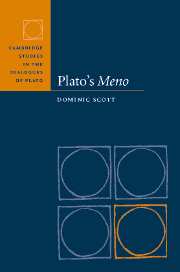Book contents
- Frontmatter
- Contents
- Acknowledgements
- Introduction
- Part I
- Chapter 1 The opening: 70a–71d
- Chapter 2 The first definition: 71e–73c
- Chapter 3 A lesson in definition: 73c–77b
- Chapter 4 The third definition: 77b–79e
- Chapter 5 Meno as an interlocutor
- Part II
- Part III
- Conclusion
- Appendices
- References
- Index of ancient passages
- General index
Chapter 1 - The opening: 70a–71d
Published online by Cambridge University Press: 29 September 2009
- Frontmatter
- Contents
- Acknowledgements
- Introduction
- Part I
- Chapter 1 The opening: 70a–71d
- Chapter 2 The first definition: 71e–73c
- Chapter 3 A lesson in definition: 73c–77b
- Chapter 4 The third definition: 77b–79e
- Chapter 5 Meno as an interlocutor
- Part II
- Part III
- Conclusion
- Appendices
- References
- Index of ancient passages
- General index
Summary
Most of Plato's works start with an introductory scene, often of considerable length, giving details about the characters involved in the dialogue, as well as its physical and historical setting. The Meno, however, appears to have no introductory scene at all. As one commentator has put it: ‘The dialogue opens with an abruptness hardly to be paralleled elsewhere in the genuine work of Plato by the propounding of a theme directly for discussion.’ The same commentator immediately goes on to criticise the dialogue for failing to live up to Plato's usual standards of literary composition. It must, he concludes, be a very early work.
Yet, although Meno propounds a theme directly for discussion, Socrates' reply takes a circuitous route, as if trying to slow the conversation down. He talks of how the Thessalians, previously renowned for horsemanship and wealth, have now acquired a reputation for wisdom. By contrast, his own people, the Athenians, are in exactly the opposite state: their wisdom has emigrated to Thessaly, leaving them ignorant about the very nature of virtue, let alone whether it is teachable. This then cues a principle that will be central to the dialogue: one cannot know how virtue may be acquired without knowing what it is (71b3–8). Only now is Socrates ready to start the philosophical discussion. But en route to this point, he has peppered his speech with proper names and allusions that send modern readers scurrying to the commentaries.
- Type
- Chapter
- Information
- Plato's Meno , pp. 11 - 22Publisher: Cambridge University PressPrint publication year: 2006

